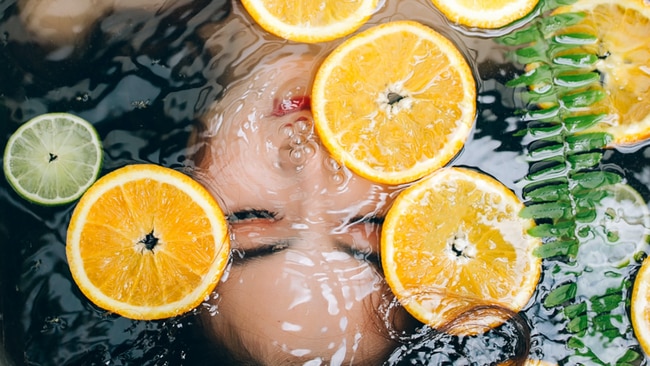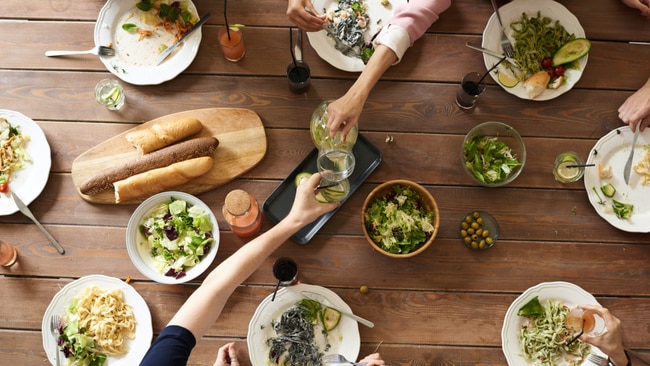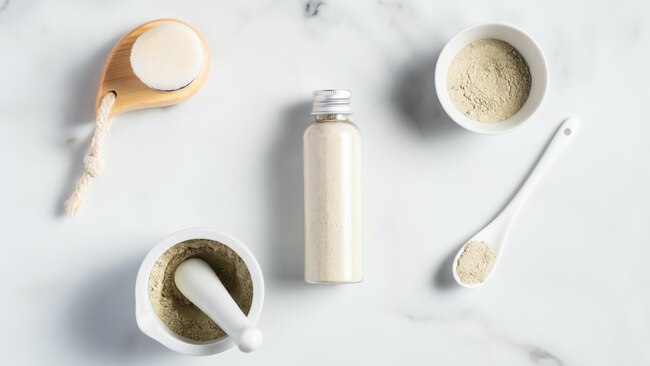Everything you should eat for younger skin
Getting to the root of the issue

Lifestyle
Don't miss out on the headlines from Lifestyle. Followed categories will be added to My News.
Meet the skin doctor whose deliciously easy anti-ageing prescription could change your complexion for the better. All it takes? Piling a few more of these superfoods on your plate.
Spending big bucks in the quest for younger skin is a tale as old as time. Turns out, the prescription could be simpler – and way more delicious – than we think.
“Skincare is an inside job,” explains Dr Thivi Maruthappu, a London-based consultant dermatologist and nutritionist who’s become famous in the beauty industry for her holistic approach. Yet the idea that what you eat affects your skin was dismissed by clinicians until very recently.
Like what you see? Sign up to our bodyandsoul.com.au newsletter for more stories like this.
As a junior registrar, Maruthappu remembers a senior doctor dismissing the suggestion that eating sweets could cause spots.
“We tend to think, ‘Oh, I’ve got a skin problem, let me put a cream on it,’ says Maruthappu. But our diet profoundly affects every layer of our skin, and if it isn’t properly nourished it shows. If the epidermis – the top layer and protective barrier – isn’t getting what it needs, it becomes dry, flaky and irritated. (The answer? Get your omega-3s: two salmon fillets a week.)
As for the dermis, or middle layer, if we care about anti-ageing we’ll look after it. Networks of blood vessels supply it with essential nutrients, and sweat and oil glands keep the skin supple and moisturised. This is where our fibroblasts produce collagen and hyaluronic acid (they need proteins, carbohydrates, fats, vitamins C, D, E, zinc, iron, selenium and copper from our diet to do their good work).
And what of the current celeb obsession with intravenous vitamin drips? Hydrating, but ultimately just “expensive wee”, according to Maruthappu, who studied medicine at the University of Oxford, has specialist training in severe eczema and psoriasis, and obtained her certificate in nutrition science from Stanford University in the US.
The subcutaneous tissue contains fat, which is a “natural filler”, she adds. Beware: weight-loss medications which “don’t discriminate on where the fat goes from. People are getting ‘Ozempic face’, where they’re losing that facial fat. It’s very ageing.”
Monounsaturated fats, which are found in avocado nuts and extra-virgin oil, and polyunsaturated fats, such as omega-3s in seeds and oily fish, are critical for all skin layers, maintaining moisture levels and supporting skin-barrier function. If you don’t eat fish, an algae omega- 3 supplement will improve your skin significantly.
Maruthappu, 42, who works in both public and private practice in London and conducts research on nutrition and skin at King’s College London, has somehow found the time to write a science-based manual for skin health. Given her expertise, it’s no surprise that Skin Food: Your Four-Step Solution to Healthy, Happy Skinis thorough and excellent. It explores the mind-skin connection (yes, stress did cause that wedding-day pimple) and suggests effective skincare, treatments for more complex skin concerns and skin-pleasing recipes.
I can vouch for the cho-cherry brownies as, after our chat at her north London home, she sent me off with a boxful. She claimed her three boys wouldn’t eat them all and I chose to believe her. Here are her top skin-saving strategies.

Moderate your biscuit habit to avoid 'sugar sag'
We rightly link sugar with weight gain. “But I don’t think people link it to their skin,” says Maruthappu. The fact is, processed and refined sugar forms molecules in the dermis called advanced glycation end products (or, appropriately, AGEs). Ideally, the dermis would be like a firm mattress, but when sugar molecules attach themselves to the collagen fibres, “They become stiff, the mattress isn’t as bouncy, and then it starts to sag.”
Outrageously, collagen levels start declining in our early 20s, speeding up during hormonal changes. “So in the perimenopausal period, because oestrogen is also so important for collagen maintenance, it really starts to decline,” she says.
Sugar can also exacerbate acne, which can be an issue in perimenopause. (Blood sugar spikes cause a rise in insulin and the hormone IGF-1, which activates sebaceous glands in the skin.) Her top foods for healthy skin ageing include blackberries, walnuts, green tea, leafy green veggies, salmon and tomatoes. So pile them onto your plate whenever possible.
Get acquainted with collagen supplements
Collagen supplements have been given a bad rap by some dermatologists. But there’s increasing evidence they can improve skin hydration and reduce wrinkling, according to Maruthappu. She’s tried them – “I think they did improve hydration.” She wasn’t sure about wrinkling, but I can report she has none. “Some people also say their hair and nails grow more quickly.”
So the question is, how do they work? Collagen supplements contain collagen peptides: “These are teeny little fragments, and they get absorbed in the blood.” Her theory is that “collagen peptides make your fibroblasts think there’s been an injury, and they, in turn, trigger more collagen production”. She advises trying a brand that includes type 1 collagen and dipeptides for three months. In addition, eat your vitamin C and iron, both essential for collagen production.
Vitamin A – fat-soluble and found in liver, mackerel, salmon, butter, cheddar, eggs, carrots, capsicum, sweet potatoes, mangos and apricots – is also important, because it boosts cell turnover and increases collagen production. In short, a major win for younger-looking skin.

Ask if your protein shake could be triggering acne
Real talk: acne affects 40 per cent of men and 50 per cent of women. Blocked pores lead to increased sebum production and more bacteria, which causes inflammation and swelling. If acne is genetic and hormonal, dietary changes don’t necessarily help. But it can be driven by diet.
“If some people eat high-sugar foods, they notice a flare-up,” says Maruthappu. Whey protein, which is made from milk, can also be a culprit because it contains concentrated amounts of IGF-1, “A hormone we naturally produce, but which can trigger increased sebum production.” Swap whey for a vegan protein powder for four weeks, she adds.
Low-fat milk also contains more IGF-1 than full-fat. Often, her patients with acne swear off butter, cheese and yoghurt. “But the data points to skimmed and semi-skimmed milk being more likely to be a trigger.” You might swap to almond or oat milk, but ensure it’s fortified. “The organic ones often don’t contain fortification, so you’re missing out on calcium, B12 and iodine.”
So, what’s good for acne? One study found less severe acne in people who were on the Mediterranean diet. Maruthappu recommends nuts, seeds and anti-inflammatory spices such as turmeric. She also notes that zinc, which is found in poultry, red meat, shellfish and pulses, has anti-bacterial and anti-inflammatory properties. (Bear in mind that phytic acid in wholegrains and legumes can interfere with absorption.)
Fill up on superfoods that fight dark spots
The good news: you’ll still get vitamin D if you wear sunscreen, says Maruthappu. But overdoing the sun worship will lead to uneven skin tone, fine lines and loss of elasticity, with the dermis most affected.
“UV light causes free radicals, and those free radicals take oxygen from other cells,” she warns. “That results in DNA damage.” Burning is a sign of significant damage. “DNA damage can accumulate over time and that’s what predisposes you to skin cancer.
“There’s damage to elastin, collagen and the fibroblasts, as well,” says Maruthappu.
Eating brightly coloured fruit and veg containing vitamins C, E and B can help neutralise the effects of free radicals produced by UV light. And all is not lost if you’ve acquired sun spots: “There are lots of ingredients that target pigmentation.” She recommends retinol, vitamin C, azelaic acid and alpha arbutin as the best dark-spot correctors.

Focus on gut health and don't restrict your diet
A growing body of science confirms that nurturing the gut microbiome also benefits our skin. We want as many species of good bacteria as possible. “They’re anti-inflammatory and help to regulate the immune system, and they dampen down unwanted autoimmunity,” explains Maruthappu. Bad bacteria, on the other hand, promote inflammation.
“Lots of skin conditions, like psoriasis and eczema, are driven by the immune system going awry,” adds Maruthappu. To nurture our microbiome, eat a variety of fruits and vegetables packed with fibre and polyphenols, the antioxidants that protect against free radical damage.
“And we want wholegrains rich in fibre [such as wholegrain rice] and probiotic foods – kefir, kimchi, live yoghurt – that introduce more good bacteria.”
She also notes that taking the probiotic lactobacillus rhamnosus during pregnancy or breastfeeding may help to prevent childhood eczema.
Eczema sufferers often cut out gluten and dairy. These can be triggers for some people, but gluten-free foods are often processed and low in fibre. If you have an instant flare-up, she advises a blood test for a diagnosis. For a delayed flare-up, keep a food diary, ideally with a dietitian. Omit the suspect food, then gradually reintroduce it. “You have to do it in a scientific way,” she recommends.
Too many young women restrict their diet to a few ‘safe foods’. Maruthappu is also no fan of the keto diet (high in unhealthy fats, bereft of fibre).
Know that cosmetics can only do so much
“People don’t realise that so much skincare doesn’t actually get to those deeper layers,” says Maruthappu – for instance, collagen-containing creams or creams that claim to plump collagen. A collagen molecule is “huge,” she explains of the common misconception. “There’s no way it will penetrate through the skin barrier and get to the dermis.”
Like watering a garden, the food we eat provides the dermis with nutrients. “If you don’t have enough vitamin C in your diet, you’ll see it in your skin.” It’s important for the formation of collagen, and with a deficiency, you’ll get thinning, easily bruised skin. On the other hand, “if you forget vitamin C in your skincare, nothing happens.” (Maruthappu has sensitive skin and her routine is simple– morning: cleanse, moisturise and SPF; evening: cleanse, moisturise.)
But her recipe for skin that genuinely glows? It’s on your plate: greens, lean protein, oils, healthy fats and whole grains. A delicious prescription your wallet, skin and tastebuds will thank you for.
Originally published as Everything you should eat for younger skin


